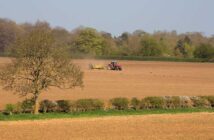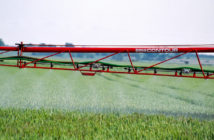Reports of take-all incidents in cereal crops have been high this year due to the conducive conditions during the growing season. As we head towards drilling, growers are warned not to forget the risk posed to barley.
Although many growers are utilising the advantages of spring barley for blackgrass control, there is an increasing trend to grow winter barley for its rotational benefits, such as providing a better entry for oilseed rape.
Certis’ technical manager, Adrian Sisson stresses why barley should not be the forgotten cereal this autumn, when it comes to controlling take-all.
“Barley is commonly drilled from September, when the take-all pathogen is active in soils. Hence why it’s extremely important not to overlook take-all control in these situations.
“As this year has seen an elevated level of take-all impacting wheat and barley crops, there is a risk that take-all inoculum in the soil will be even greater than usual, posing a higher risk to this year’s crops.
“The best thing that growers can do to protect crops and yields this season is to use a seed treated with a specialist seed treatment, such as Latitude (silthiofam), at drilling.”
Mr Sisson explains the economic benefits of using this product on winter barley crops.
“In a medium risk situation at a barley seed rate of 150 kg/ha the yield needed to cover the cost of Latitude is 0.26 t/ha, based on a feed barley price of £114/t. As the average yield response from this seed treatment is 0.4 t/ha, this means the initial cost can be recovered from the potential gain.
“It’s also important to note that if a malting barley variety is being grown, the premium would increase these gross margins further,” he adds.
“When thinking about drilling a winter barley this autumn, growers need to be aware of the risks that are posed by take-all and that there is an insurance policy in the form of a specialist seed treatment, such as Latitude, which can ensure that crops are protected from the yield robbing disease,” says Mr Sisson.




